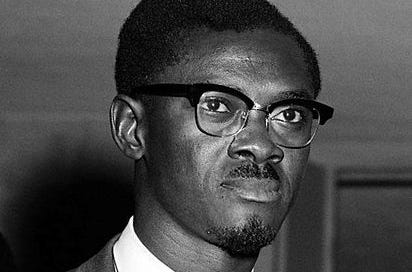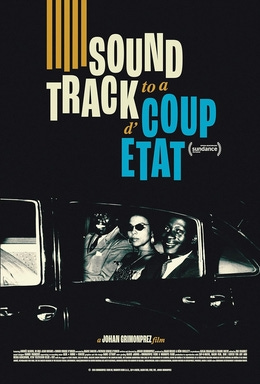When did you become aware of history? Perhaps each of us can remember a moment when world events beyond our family, school, or hometown environment began to register (if you have such a memory, you can share it in the comments section below).
A current, shocking documentary film evoked that transitional time for me. Soundtrack to a Coup d’Etat covers the turbulent year 1960 in the Congo. Names like Tshombe, Kasavubu, and Lumumba were stored away in my memory — perhaps I had originally read about them in My Weekly Reader, a little newsletter handed out to grade school kids.
What we knew then as the Belgian Congo had endured a complex history. In the 1880s Belgium’s King Leopold II was given sovereignty over a territory in central Africa eighty-five times as large as Belgium itself. He called this personal fiefdom the Congo Free State, but it was in fact a slave regime. Men were whipped and beaten to extract forced labor on rubber plantations. Failure to meet production quotas meant death. Torture and atrocities were common, as were famine and epidemics of disease. Millions died while Belgians profited.
Leopold died in 1909, but Belgian rule of what came to be called the Democratic Republic of the Congo continued until 1960. That year, on June 30, the Belgians handed power to the ceremonial president, Joseph Kasavubu, and to the prime minister, Patrice Lumumba. The Belgian king arrogantly insisted, “Show that we were right to trust you.” Lumumba was thirty-four years old, educated, and a dynamic speaker. He declared: “We who suffered in our bodies and hearts from colonialist oppression, we say to you out loud: from now on, all that is over.”
Lumumba’s desire to break free from the country’s domination by Europeans and their exploitation of his nation’s resources raised the suspicions of both Belgians and Americans. The U.S. had used uranium from the Congo to fashion the atom bombs dropped on Japan. The country was a source of other important minerals. It still has more than half the world’s reserves of cobalt.
Lumumba was not a communist, but Americans worried when he requested military aid from the Soviets. They felt that his vision of a “United States of Africa” was subversive.
Much of the country’s mineral wealth came from Katanga Province in the south. The Belgians backed local leader Moïse Tshombe, who declared that Katanga would break away from the Lumumba’s central government. Belgium troops, welcomed by Tshombe, arrived to put down rioting there. They went on to take over the new nation’s airports and to advance on the capital.
Lumumba appealed to the United Nations. Peacekeepers arrived but failed to resolve the situation. President Dwight Eisenhower ignored Lumumba when the African leader visited the United States. Eisenhower’s CIA suggested that Lumumba was a pawn of the communists. By August, two months after Congolese independence, plans were afoot to eliminated Lumumba by any means necessary.
The means turned out to be murder. Lumumba was taken prisoner and transported to Katanga. With at least the tacit approval of Eisenhower, Belgian soldiers oversaw his torture and killing in January 1961. A Belgian author who covered the incident labeled it “the most important assassination of the 20th century” because of its global implications.
Another Congolese political actor of the time, Joseph Mobutu, took power in 1965 and ruled the country, renamed Zaire, as a dictatorship until 1997. Civil wars and political chaos have dominated the region in recent decades. The wealth derived from the country’s enormous resources has yet to benefit the average citizen.
In the past week, a rebel force backed by neighboring Rwanda invaded eastern Congo, captured the city of Goma, and terrorized civilians. The United States has temporarily cut off humanitarian aid to the Congo, and to all countries.
Soundtrack to a Coup d’Etat, which has been nominated for an Academy Award, is a dense and imaginative examination of a complex subject. The film, by Belgian director Johan Grimonprez, uses newsreel footage, interviews and music to tell a dramatic story too long ignored. The New York Times called it “a piece of true history structured like a spider web and drenched in real urgency.”
One striking aspect of the documentary is the awareness of Black American intellectuals and musicians, including Louis Armstrong, Dizzy Gillespie, Nina Simone, and Malcolm X, who were concerned about what was happening in Africa. “You’ll never get Mississippi straightened out,” Malcolm X told a crowd in Harlem, “until you start realizing the connection with the Congo.” In February 1961, when news of Lumumba’s murder broke, jazz singer Abbey Lincoln, along with poet Maya Angelou and others, led a demonstration that disrupted United Nations proceedings.
The events that took place during that era did not penetrate the awareness of most Americans. Although the names might have a familiar ring, the story behind them is far more complex and tragic than what we were led to believe. Films and books can remind us that history, in all its complicated and fascinating detail, is unfolding around us every day.
Soundtrack to a Coup d’Etat is available on many streaming services. To check out the trailer, click HERE.








Damn and I thought our country was pretty stinky. You certainly have opened my eyes Jack. Thank you for another Talking to America that I won't forget for a long while
That was illuminating. Thank you, Jack.